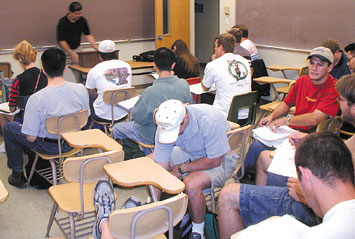Classes cope with tragedy

Image: Classes cope with tragedy::
September 17, 2001
The moment professor Gina Spadafori heard the news of the Sept. 11 terrorist attacks, she knew that plans for her Journalism 130 class were out the window. Even as she thought about the human tragedy, she realized that the explosions in New York, Washington D.C. and Pennsylvania would affect her class.
Spadafori, like many Sacramento State professors, is carrying on as she deals with her emotions, the emotions of her students and the need to adjust her class curriculum to accommodate the time lost to last week?s campus closure.
Many professors still don?t know exactly what they will do to make up for the lost class time, but they are keeping things in perspective.
“Closing the university gave everyone a chance to deal with their feelings, to be with family or talk with friends,” Spadafori said. “Canceling class was the right move.”
When classes reconvened the next day, many professors looked for ways to combine class material with discussion of the terrorist attacks.
“We have to incorporate this into our discussion,” said government and journalism professor William Dorman.
Dorman has been at Sac State since the mid-sixties, and has seen every conflict from the Vietnam War to the Gulf War. He said that his students seemed to be handling last week?s news in different ways.
“Lower division students are in a kind of netherworld. The impact hasn?t really hit them yet,” Dorman said. “Upper division students are curious academically and personally.”
Professor Robert Friedman, another government instructor, said that he expects while students are numb and sad now, many will become increasingly angry. He warned that people should try to avoid jumping to conclusions, a point he emphasized in his Government 1 class.
“We talked about how rumors would start coming out and that we shouldn?t have a knee-jerk reaction based on ?obvious truths,?” Friedman said.
He compared media treatment of last week?s attacks to coverage of the Columbine High School massacre. During that crisis, many media reports from the scene were eventually proven false.
“It?s just like Columbine, the way the media rushes to judgment,” Friedman said of early coverage of last week?s tragedy. “Many things that have been reported early on will probably turn out to be wrong.” He cautioned his class to be careful about what they hear in the news during the next few days.
Spadafori agreed. Her journalism lecture focused on the obstacles to reporting during a disaster and she encouraged students to talk about whether they would cover an event like the Trade Center or Pentagon attacks. The tendency of television to erroneously report rumors in a crisis was a big part of the class discussion.
Professors across the campus will be dealing with the rippling effect of the tragedy for the rest of the semester, as they juggle schedules and attend to student?s emotional needs. But, as Dorman said, “My syllabus problems are nothing compared to what?s going on right now.”
Spadafori is concerned about the future. “We?re not done yet. We might need to be more flexible down the line if something else happens. Family or jobs in the reserves might call some people away. Nobody knows what?s going to happen next.”




























































































































